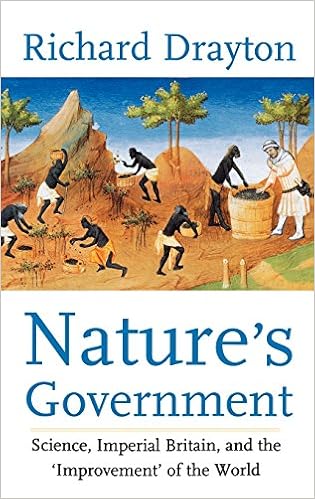
Free Downloads Nature's Government: Science, Imperial Britain, And The "Improvement" Of The World

'Nature's Government' is a daring attempt to juxtapose the histories of Britain, western science, and imperialism. It shows how colonial expansion, from the age of Alexander the Great to the twentieth century, led to complex kinds of knowledge. Science, and botany in particular, was fed by information culled from the exploration of the globe. At the same time science was useful to imperialism: it guided the exploitation of exotic environments and made conquest seem necessary, legitimate, and beneficial. Drayton traces the history of this idea of 'improvement' from its Christian agrarian origins in the sixteenth century to its inclusion in theories of enlightened despotism. It was as providers of legitimacy, as much as of universal knowledge, aesthetic perfection, and agricultural plenty, he argues, that botanic gardens became instruments of government, first in Continental Europe, and by the late eighteenth century, in Britain and the British Empire. At the Royal Botanic Gardens at Kew, the rise of which throughout the nineteenth century is a central theme of this book, a pioneering scientific institution was added to a spectacular ornamental garden. At Kew, 'improving' the world became a potent argument for both the patronage of science at home and Britain's prerogatives abroad. 'Nature's Government' provides a portrait of how the ambitions of the Enlightenment shaped the great age of British power, and how empire changed the British experience and the modern world. Richard Drayton was born in the Caribbean and educated at Harvard, Oxford, and Yale. A former Fellow of St. Catharine's College, Cambridge, and Lincoln College, Oxford, he has also been Associate Professor of History at the University of Virginia.

Hardcover: 354 pages
Publisher: Yale University Press (August 1, 2000)
Language: English
ISBN-10: 0300059760
ISBN-13: 978-0300059762
Product Dimensions: 6.1 x 0.9 x 9.2 inches
Shipping Weight: 2.2 pounds (View shipping rates and policies)
Average Customer Review: 5.0 out of 5 stars See all reviews (4 customer reviews)
Best Sellers Rank: #1,928,237 in Books (See Top 100 in Books) #82 in Books > Crafts, Hobbies & Home > Gardening & Landscape Design > Wild Plants #1203 in Books > Crafts, Hobbies & Home > Gardening & Landscape Design > By Region #2838 in Books > Politics & Social Sciences > Social Sciences > Emigration & Immigration

Drayton's main point is to show the inter-relatedness of imperial control over nature and people. Natural sciences and political economy became related. That is, an understanding of nature's laws would help improve the administration of people and things/environment. Botany facilitated improvement ["a commitment to the reform of the world as a whole" p. 104], and improvement by the state justified empire.He seeks to show this by concentration on Kew as a place where science and expansion converged (even while sitting at the very heart of the center. "What matters is Kew as an agent and product of modern history, as a space in which ideas about nature, economy, and legitimate authority interacted with concrete policies over Imperial Britain's nineteenth century." p. xvii. "From the 1780s onwards, however, it became a de facto national collection, to which seeds and bulbs were sent from every part of the world. More strikingly, Kew became a source of plants, and of gardeners, sent outwards to Britain's overseas dominions." p. 108.He offers this summary: "Botanical knowledge, linked to the global transit of exotic commodities, had come to symbolize an imperium both rational and divine." p. 25."Systems of classification, as much as sextants and chronometers, allowed Europeans to perceive themselves as the magistrates of Providence, equipped by their knowledge of its laws with responsibilities over all of creation." p. 45. This knowledge justified their dominion. "British `improvers' moved, at home and abroad, in the faith that they ultimately knew better than those on the ground. Their confidence depended, in part, on the assumption that they possessed a more profound understanding of how Nature worked." p. 90.
Nature's Government: Science, Imperial Britain, and the "Improvement" of the World Brain Training And Brain Games for Memory Improvement: Concentration and Memory Improvement Strategies with Mind Mapping (New for 2015) La Espana Imperial/ The Imperial Spain (Spanish Edition) Britain BC: Life in Britain and Ireland Before the Romans (Text Only) Life After Death: The Viola da Gamba in Britain from Purcell to Dolmetsch (Music in Britain, 1600-1900) NUEVA YORK /NEW YORK: El Estado Imperial (World Almanac Biblioteca De Los Estados/World Almanac Library of the States) (Spanish Edition) Regulating for Competition: Government, Law, and the Pharmaceutical Industry in the United Kingdom and France (Government-Industry Relations) Social Security, Medicare and Government Pensions: Get the Most Out of Your Retirement and Medical Benefits (Social Security, Medicare & Government Pensions) Wonders of the World: Mother Nature at Work: Nature Books for Kids (Children's Mystery & Wonders Books) Pricing and Cost Accounting: A Handbook for Government Contractors: A Handbook for Government Contractors Winning Government Contracts: How Your Small Business Can Find and Secure Federal Government Contracts up to $100,000 Fundamentals of Government Information: Mining, Finding, Evaluating, and Using Government Resources Allied Combat Medals of World War 2: Britain, the Commonwealth and Western European Nations (Modern weapons of the world) The Government Manager's Guide to Source Selection (The Government Manager's Essential Library Book 2) Contracting Out Government Services (Privatizing Government: An Interdisciplinary) The Life of Captain Cipriani: An Account of British Government in the West Indies, with the pamphlet The Case for West-Indian Self Government (The C. L. R. James Archives) Application of Mutation Breeding Methods in the Improvement of Vegetatively Propagated Crops: An Interpretative Literature Review (Developments in crop science) Science in Wonderland: The scientific fairy tales of Victorian Britain The Fourth Part of the World: An Astonishing Epic of Global Discovery, Imperial Ambition, and the Birth of America FISH: Fun Facts and Incredible Pictures on Animals and Nature: Fish (AGE 7-12) (Children's Books on Animals & Nature, fish,)



